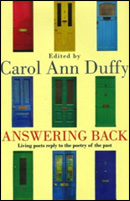 Few are they who will greet the appearance beneath the Christmas tree of a new collection by, say, Mick Imlah or Kathryn Simmonds with a grateful murmur. Even the most literary-minded folk tend to think contemporary poetry is wilfully difficult, awkward and cussed: too much demand for too little reward. But for those who'd like to know more yet don't know where to start, The Forward Book of Poetry 2009 (Forward, £8.99) is a good way in. Both Imlah and Simmonds, as winners this year in Britain's richest poetry awards, are featured, together with dozens more of the best British and Irish poets currently writing.
Few are they who will greet the appearance beneath the Christmas tree of a new collection by, say, Mick Imlah or Kathryn Simmonds with a grateful murmur. Even the most literary-minded folk tend to think contemporary poetry is wilfully difficult, awkward and cussed: too much demand for too little reward. But for those who'd like to know more yet don't know where to start, The Forward Book of Poetry 2009 (Forward, £8.99) is a good way in. Both Imlah and Simmonds, as winners this year in Britain's richest poetry awards, are featured, together with dozens more of the best British and Irish poets currently writing.
One way in which poetry publishers try to attract new readers is through themed anthologies, and Christmas is traditionally when they appear. Three new titles in Eland's Poetry of Place series - Dublin, England and Rome (£6.99 each) - provide a model for this sort of book. Each combines the canonical with the obscure, and includes a brief but informative note on the featured poets. AN Wilson's selection for England, for instance, strikes the familiar nostalgic and celebratory tone - "Home-thoughts from Abroad" and "The stately homes of England, / How beautiful they stand ..." - but rubbing up against these you'll find Geoffrey Hill evoking Herefordshire apple trees and Stevie Smith on England's dogs. And, at the end, there's a wonderful short section of English protest poems that includes Ernest Jones's marvellous "Song of the Low". It's elegantly designed and small enough to fit in a coat pocket or a Christmas stocking.
Another elegant way of combining past and present in one volume is provided by Answering Back (Picador, £8.99), for which the editor, Carol Ann Duffy, has invited 50 of her peers to respond, in verse, to a favourite poem from the past. Entries range from Liz Lochhead's take on John Donne to the great American modernist William Carlos Williams's red wheelbarrow filtered through the consciousness of Barnsley FC's poet in residence, Ian McMillan. No less varied in scope is Women's Work, edited by Eva Salzman and Amy Wack (Seren, £12.50), a hefty assemblage of poems on love, death and everything in between by 250 British, Irish and American writers. Salzman's introduction makes an excellent case for the necessity of this gender-restricted selection.
As this week was Milton's 400th birthday, it would be remiss to ignore Oxford's timely reissue of Paradise Lost (£9.99) in a typographically beautiful edition illustrated with 17th-century engravings. Philip Pullman's introduction makes a crucial point about how poetry should be enjoyed: namely that it must live not only in the mind and the heart, but in the mouth. It has to be spoken. "The experience of reading poetry aloud when you don't fully understand it," he writes, is "like suddenly discovering that you can play the organ. Rolling swells and peals of sound are at your command." As everyone knows, Milton really does give Lucifer all the best tunes, but, since it's Christmas, one should also note Rowan Williams's Headwaters (Perpetua, £9), in which the Archbishop of Canterbury - a subtle and skilled poet - muses on faith, martyrdom, Shakespeare and his Welsh heritage.
Last of all, three books that will appeal mainly to the cognoscenti: Words in Air (Faber, £40, reviewed on page 6), the correspondence of two of the greatest American poets of the last century, Elizabeth Bishop and Robert Lowell; The Making of a Sonnet, edited by Edward Hirsch and Eavan Boland (Norton, £19.99), which is both an anthology and a masterclass on the history and inner life of the 14-liner; and Isaac Rosenberg (Oxford, £50), Vivien Noakes's definitive critical edition of the poems, plays and letters of an unjustly neglected voice from the trenches of the first world war.
The Guardian
15/12/2008